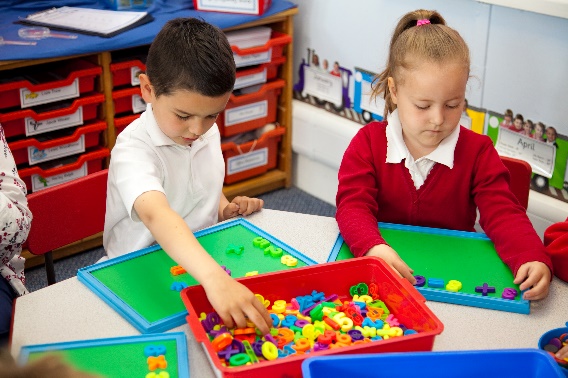2024-25 Specialist Knowledge for Teaching Mathematics (Primary Early Career Teachers) - first two years of teaching - (Phase 1) - Hereford
Friday 8 November, Friday 15 November, Friday 7 March, Friday 13 June Hereford
Dates
Friday 8th November 2024 Online Launch 1530-1615
Workshop 1: Friday 15th November 2024 - 0930-1500 - Venue Hereford Group Training Centre
Workshop 2: Friday 7th March 2025 - 0930-1500 - Venue Hereford Group Training Centre
Workshop 3: Friday 13th June 2025 - 0930-1500 - Venue Hereford
When booking, please note the dates and times in your diary, and submit your cover request in school.
This project offers support tailored to the needs of Early Career Teachers to develop as teachers of maths. The induction process for new teachers has undergone a significant change, with a consistent approach being introduced through a 2-year core framework. Under this framework, ECTs focus on general principles of teaching practice in their first year, and subject-specific aspects in the second year; maths content is limited to one part of this overall offer. This project does not replace the statutory ECT offer but complements it. Maths subject knowledge continues to be an area of development for many practitioners in the primary phase and this project is designed to support ECTs to focus on learning behaviours in the classroom and to notice the range of their maths-specific practices. Phase 1 focuses on a single mathematical area to ensure time is spent on depth, as opposed to breadth, of content.
Responses from previous participants show that the Work Groups have allowed them to gain confidence through developing their subject knowledge:
“My subject knowledge has improved not just for KS1 but for KS2 as well. I am now able to easily assess the materials needed from NCETM and I am more aware of the small steps involved in each of the areas in Maths and will carry this forward with planning my own lessons.”
“I am looking forward to consolidating the material I have used on this programme in my practise and teaching. I also think that this has allowed me to be more confident in my subject knowledge and teaching maths in general as I feel I now have stronger foundational understanding of mathematical concepts and the importance of the learning journey for the children.”
This programme strikes a balance between developing teachers’ maths subject knowledge and pedagogical content knowledge, alongside classroom practice to support the learning of maths. Phase 1 (the first year) of this two-year programme focuses on exploring key concepts in the development of number sense and reviewing maths practices such as observing pupils, designing lessons and analysing pupil centred tasks.

Previous participants have commented that engaging with this programme has enabled them to be part of a vibrant ECT community and the evaluation of this programme identified that:
"This new project is highly valued by Cohort Leads and participants who have appreciated the high-quality PD and support which is making a difference to teachers’ practice. It is already starting to have pupil impact in the classroom."
Following this year’s Work Group, participants observed improved outcomes for their own pupils:
“Pupils have begun to show understanding when answering and explaining reasoning. Pupils also appear to be more engaged in the lessons since I have implemented things learnt from this programme. Pupils have begun to use more mathematical language when sharing answers or questioning things.”
“Pupils have enjoyed Maths this year and have improved outcomes from a greater depth in their understanding. Pupils have become more confident when using the manipulatives and the PD materials has helped the children to be more independent with their learning and apply the knowledge to other areas of their Maths work.”
It is anticipated that participants will carry on into Phase 2 after Phase 1, so this project can be viewed as a two-year commitment.
Who will be leading the group?
Julie Marston and Louise Langford
Julie is a Primary Maths Teaching for Mastery Specialist and NCETM PD Accredited lead. Julie has a Masters in Primary Maths, specialising in Variation Theory, MaST qualification and excellent experience across the full range of primary classes.
Louise is an NCETM PD Accredited Lead and experienced Mathematics subject leader, who has experience across the full primary age range and now works in Initial Teacher Training. She has an MA in Education- Early Mathematics Intervention, a PGCE SpLD, is an accredited assessor and specialist teacher for Mathematical Learning Difficulties and Dyscalculia.
Who is it for?
Participants will be those identified as Early Career Teachers – teachers in their first or second year of teaching. Participants also must not have taken in the Early Career Teachers Work Group in 2021-22, 2022-23 or 2023-24.
Joining details will be sent by email approximately ten days before the first workshop and will be noted in the Basecamp community for the participants of this Work Group.
What are the intended outcomes?
Pupil outcomes
Pupils will:
- engage positively with challenging content
- use appropriate representations to support their mathematical work
- use appropriate mathematical vocabulary to explain their thinking.
Practice development
Participants will:
- observe learning to identify how children are approaching their maths and review the implications of these observations for their practice
- review tasks set to ensure they support learners with developing their mathematical thinking strategies
- work with their mentor to engage constructively with colleagues and mentors, sharing with them the professional learning taking place within this programme.
Professional learning
Participants will:
- enhance their maths subject knowledge with an emphasis on the key concepts, the representations and the language used to help pupils develop number sense
- identify common misconceptions and ways of addressing these to help pupils master important concepts
- review lessons/lesson sequences to identify how representations have been used to support the learning of the concept
- develop an understanding of key principles and approaches associated with teaching for mastery
What is the cost?
Funded by DfE so participation is free for schools
Work group full
